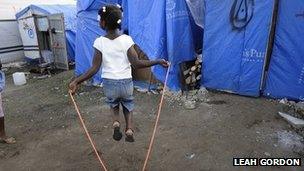Haiti earthquake: Did appeal money make a difference?
- Published

Many people are still living in temporary camps two years after the earthquake
The British public donated £107m ($168m) after the 2010 Haiti earthquake, an amount second only to that raised for the Indian Ocean tsunami. But how has that money helped Haiti two years on?
The relief effort began in the immediate aftermath of the devastating quake that struck the Caribbean nation of Haiti on 12 January 2010.
It left 220,000 people dead and 180,000 homes either damaged or destroyed.
The UK's Disasters Emergency Committee (DEC) says 1.5 million people were forced to live in makeshift shelters in streets and open spaces following the earthquake.
According to the DEC, half-a-million people in the capital Port-au-Prince are still in these temporary camps.
'Road to recovery'
The Haiti appeal in the UK has helped 1.8 million survivors over the past two years, say aid agencies.
But the DEC says the task of rebuilding Port-au-Prince is the underlying cause of what it terms an "extended emergency".
Haiti is the poorest country in the Americas and many people existed in terrible conditions in the capital, even before the earthquake.
Disease is also a problem, with cholera resurgent last October during the rainy season.
Brendan Gormley, chief executive the DEC, said: "With some sources of emergency funding already beginning to run dry, many survivors have seen the provision of basic services, such as water, discontinued in the camps where they still live.
"The DEC took the view soon after the earthquake that the road to recovery in Haiti would be long and hard, so we decided to spend the funds we had raised over three years rather than the usual two.
"Increasingly, however, our member agencies are seeking to shift the provision of basic services progressively onto a more sustainable footing."
The DEC is an umbrella organisation of leading British aid agencies.
Among its members' projects in Haiti, the British Red Cross gave cash grants to 4,000 families forced out of a camp in Port-au-Prince.
Cafod is building 100 permanent earthquake and hurricane resistant homes in Gressier. And medical charity Merlin worked in Port-au-Prince and Petit Goave to provide cholera treatment for 3,000 patients.
In addition, the British government provided £20m in emergency support for charities.
One of the biggest projects the UK was involved in was to help rebuild Haiti's shattered prison infrastructure, after jail-breaks took place on a massive scale.
About 5,000 inmates escaped, including 4,000 from the main central prison, when walls crumbled and jail guards returned to their homes in the wake of the earthquake.
London-based campaign organisation the Haiti Support Group says life in the camps is "unremittingly grim".
Phillip Wearne, from the group, said: "Over half-a-million people are living in tents or shelters, and that's no joke in the middle of the rainy season or the middle of a cholera epidemic.
'Long-term work'
"Many people who have left the camps have gone to buildings that have been marked 'red' as dangerous - should there be another tremor we would see another major disaster.
"Port-au-Prince is one of the most densely populated places in the world, so it's basically people living on top of each other."
The group says more priority should have been given to projects after the immediate relief effort had taken place, working through the Haitian government to improve infrastructure.
Last year, Lord Ashdown was tasked by the government to conduct a review, external following concerns about the effectiveness of the UK's response disasters such as the Haiti earthquake and the Pakistan floods in 2010.
His report concluded that Britain could do better and more lives could be saved.
The number of people affected by disasters is forecast to increase from 250 million to 375 million a year by 2015, with factors such as rising sea levels having an impact.
Lord Ashdown said the UK was "caught in a race between the growing size of the humanitarian challenge, and our ability to cope".
"It's not a race, bluntly, that we think we are currently winning. Enhancing the status quo will not be sufficient," he said.
Mr Gormley says much has been achieved in Haiti thanks to the donations made by British people - but there will still be more to do once the money has been exhausted.
As he puts it: "Overcoming the challenges that remain will increasingly be a question of how to push forward social and economic development in a chronically poor country with a troubled past.
"Although DEC funds will all be spent, as intended, on emergency and recovery work within three years of the earthquake, the vast majority of DEC member agencies were present before the earthquake and their long-term work in Haiti will continue well beyond January 2013."
- Published28 March 2011
- Published12 January 2011
- Published10 July 2010